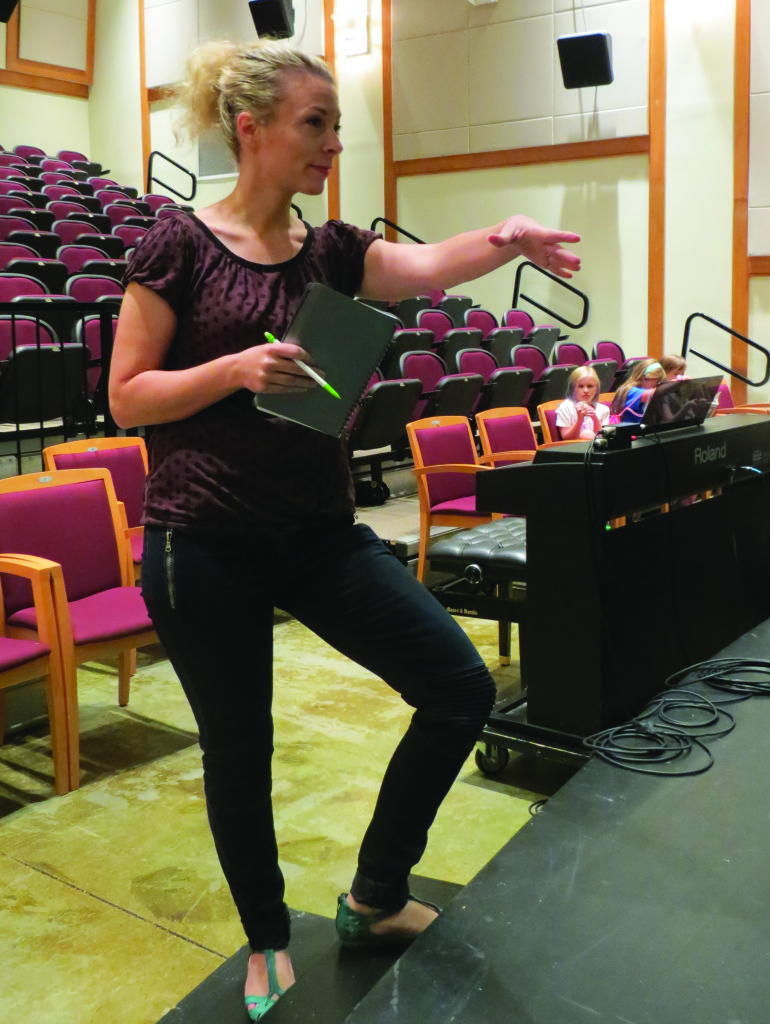
She greets me with an enthusiastic wave from a high top table in the Holly Springs Cultural Center’s lobby. I have in my arms a small stack of library books to return and she comments on one of the titles. “We’re in the middle of potty training, too,” she says, and we spend the next few moments commiserating. Ten minutes later I realize I’ve just told Angie Ottosen-Staheli my life story.
Perhaps that’s what happened each time she visited a local cemetery to do research on her latest project, a play based on the history of Holly Springs from Civil War to present day. Something about Angie makes you want to open up. You get this sense that your story is safe with her, that she will carry it in her bones and protect it with all that is in her. It’s with that sense of responsibility that she has crafted the play—Finding Patience – The Story of Holly Springs—which will have 10 performances throughout the month of June next year. It is a piece of historical fiction, which means that Angie is free to get to what she believes is the heart of the story, to let her creative mind wander and explore. It is precisely what she did during the two years prior to writing the script: explore. She read up on Holly Springs history, picked the brain of historian Barb Koblich, and poked around our unique little town.
Hailing from the Pacific Northwest, Angie moved here with her husband, David, and three boys, Parker (10), Lincoln (7), and Ander (3). She studied theater and sociology in college and has been writing, directing, and acting in plays for the past decade plus. Her plays have been performed in Texas, Pennsylvania, Washington, Mississippi, and Utah. Her roles have changed with the seasons; when she’s too busy with little ones to act, she squeezes in long writing sessions in the dark, next to her husband in bed, or at the kitchen table with children playing in her peripheral vision. Those long bouts of writing are done now. Now, it’s time for her words to take center stage.
A lot of Angie’s early research for Finding Patience happened in local cemeteries. “I love cemeteries. My kids will tell you they’re sick of them,” she says, laughing. Angie would walk through them and jot down information from the tombstones that piqued her interest. And so it’s fitting that the play is set in a cemetery. The characters she “met” and created lived in her head for 2 ½ years, and then at the start of 2016, she started writing. More accurately in her mind, “It wrote itself. It happened so fast because it was already there.” The play explores such themes as perseverance, optimism, race relations, grief, courage, war, faith, forgiveness, and death. Angie’s own mother was diagnosed with stage 4 cancer while Angie was writing the play. Thankfully, she got to read it. “She loved it,” Angie tells me with tears in her eyes. She hopes the greater community will, too.
In a time when remakes and sequels inundate the theaters, Angie champions the original. “There are so many stories that need to be told,” she says. “I’m a big fan of original work.” And when she first visited the town of Holly Springs and learned a little about its history, the presence of slavery, the population fluctuations after the Civil War, the poverty that clung to the area, the historical buildings that still stand to this day, she knew she wanted to live here. And when she laid eyes on the beautiful performance space in the Cultural Center with its state-of-the-art sound and lighting systems, she knew she wanted to write a play about it.
The history of Holly Springs is unique, even with regards to the neighboring towns of Fuquay-Varina and Apex. The town was predominantly African American and many descendants of slaves lived here and still do to this day. With the incredible growth our community has experienced, Angie doesn’t want the story to get lost. “There’s a Chinese proverb I always think of,” she says. “It goes, ‘When you drink the water, don’t forget the well from whence it sprang.’ We’re all drinking the water,” she says. The metaphor is not lost on me in a town named after a spring.
Like many of us, Angie is a transplant, but she believes there’s something very special about this place. It’s evident when speaking to her that Angie feels a responsibility to tell Holly Springs’ story with a certain self-awareness and the utmost of respect. She is fully conscious of the fact that she is a white woman writing dialogue for an African American one. However, it’s not something she embarked on a whim. She studied dialects in college and took race relations classes. While writing the play she read through slave narratives (you can too at http://docsouth.unc.edu/neh), consulted historians, and reached out to many descendants of people portrayed in the play. “We don’t talk about the fact that there were slaves here,” she says. Her hope is that this play can further a much-needed dialogue, and ultimately bring us all a bit closer together.
After all, “In terms of history, the play is not finished,” she says. “We’re creating it right now.”
To get involved with the production, either on stage or behind the scenes, join the Facebook page: Finding Patience – Information and Updates. Auditions will be held in early February.